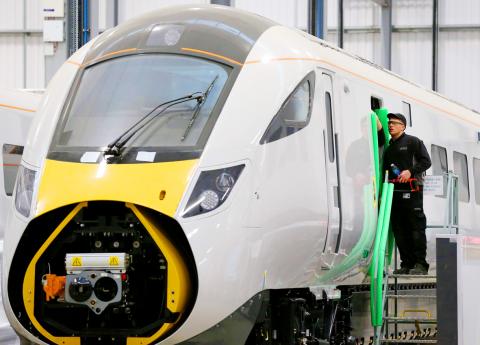The first Intercity Express train to be built at Hitachi Ltd’s UK plant has been unveiled.
The train is one of 122 ordered by the British government in a £5.7 billion (US$7.17 billion) deal to run on mainlines between London and the UK’s southwest and from the capital to Scotland on the east coast route.
The Japanese manufacturer’s fleet of Class 800 trains will now mostly be produced in the UK at its plant in Newton Aycliffe, County Durham, which opened last year.

Photo: AFP
The trains can reach speeds of 225kph and can operate on diesel, or electrified tracks, or both. They are due to begin operating on the Great Western mainline from summer next year and on the east coast mainline the following year.
Hitachi’s Intercity Express Program (IEP) contract was controversial partly because of the bi-mode design and cost, and partly because it came at the expense of existing UK-based manufacturers. The IEP train shells are still constructed in Japan, although many other components come from UK suppliers.
Hitachi and the government have promised the trains will boost capacity, reliability and comfort for passengers.
“Today is a celebration of the return of train manufacturing to the north-east, supporting thousands of jobs and developing a strong engineering skills base in the region,” Hitachi Rail Europe managing director Karen Boswell said. “The company that built the world famous bullet trains is now building the next generation of UK trains, which will deliver a step-change in intercity travel, offering more capacity, greater comfort and a lower carbon footprint.”
The plant is to employ 900 people by spring next year, and Hitachi’s total workforce will be more than double that as it opens new maintenance facilities for its fleet.
As well as having manufactured the Shinkansen, or bullet train, in Japan, the company built the trains used in the UK’s only high-speed service, the High Speed 1 in Kent.

Merida Industry Co (美利達) has seen signs of recovery in the US and European markets this year, as customers are gradually depleting their inventories, the bicycle maker told shareholders yesterday. Given robust growth in new orders at its Taiwanese factory, coupled with its subsidiaries’ improving performance, Merida said it remains confident about the bicycle market’s prospects and expects steady growth in its core business this year. CAUTION ON CHINA However, the company must handle the Chinese market with great caution, as sales of road bikes there have declined significantly, affecting its revenue and profitability, Merida said in a statement, adding that it would

Greek tourism student Katerina quit within a month of starting work at a five-star hotel in Halkidiki, one of the country’s top destinations, because she said conditions were so dire. Beyond the bad pay, the 22-year-old said that her working and living conditions were “miserable and unacceptable.” Millions holiday in Greece every year, but its vital tourism industry is finding it harder and harder to recruit Greeks to look after them. “I was asked to work in any department of the hotel where there was a need, from service to cleaning,” said Katerina, a tourism and marketing student, who would

i Gasoline and diesel prices at fuel stations are this week to rise NT$0.1 per liter, as tensions in the Middle East pushed crude oil prices higher last week, CPC Corp, Taiwan (台灣中油) and Formosa Petrochemical Corp (台塑石化) said yesterday. International crude oil prices last week rose for the third consecutive week due to an escalating conflict between Israel and Iran, as the market is concerned that the situation in the Middle East might affect crude oil supply, CPC and Formosa said in separate statements. Front-month Brent crude oil futures — the international oil benchmark — rose 3.75 percent to settle at US$77.01

RISING: Strong exports, and life insurance companies’ efforts to manage currency risks indicates the NT dollar would eventually pass the 29 level, an expert said The New Taiwan dollar yesterday rallied to its strongest in three years amid inflows to the nation’s stock market and broad-based weakness in the US dollar. Exporter sales of the US currency and a repatriation of funds from local asset managers also played a role, said two traders, who asked not to be identified as they were not authorized to speak publicly. State-owned banks were seen buying the greenback yesterday, but only at a moderate scale, the traders said. The local currency gained 0.77 percent, outperforming almost all of its Asian peers, to close at NT$29.165 per US dollar in Taipei trading yesterday. The